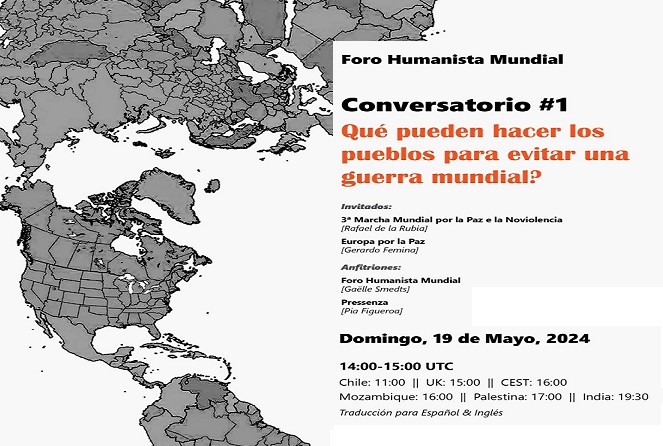Faced with the alarming situation of violence spreading across the planet and threatening to trigger a global armed conflict, even with the use of nuclear weapons, the World Humanist Forum invites to an in-depth dialogue that will help people to take decisive action to change the scenario.
While multitudes take to the streets to denounce the stupidity, deafness, and cynicism of criminal governments, the media and corporate social networks are trying to silence the people’s cry for peace and a world worthy of humanity.
The initiative aims to amplify the voice of those who work every day for a different world and is part of a series of virtual meetings promoted by the World Humanist Forum to address different aspects of a situation marked by a system that is incompatible with the best aspirations of the human species.
The first discussion, entitled “What can we do to prevent a world war”, will take place on 19 May (11 am Chile; 2 pm UTC; 4 pm Mozambique; 5 pm Palestine; 7.30 pm India) and will feature Rafael de la Rubia, promoter of the Third World March for Peace and Nonviolence, and Gerardo Fémina, an activist from Europe for Peace.
The dialogue will be held in Spanish with English interpretation and the link to access it is
https://us02web.zoom.us/j/82776306022?pwd=OFJvOERhRnp2NDllYVRuc2ltZUltQT09.
With these meetings, the World Humanist Forum wants to encourage collectives and organizations to facilitate rapprochement, to promote an unprejudiced debate on the directions to take, to strengthen the factors of change and to join forces to overcome the retrograde resistance that hinders it. In short, to go beyond the limits of what is possible towards a different reality.
The World Humanist Forum
The World Humanist Forum aims to become a permanent instrument of information, exchange of ideas, and common action between people and institutions from different cultures of the world.
Its main objective is to develop a clear understanding of the major challenges facing humanity and to find the best practical formulas for common action.
The Humanist Forum began in Moscow in 1993. On that occasion, Silo, founder of the New Humanism movement, who the day before had received an honorary doctorate from the Russian Academy of Sciences, said: “The Humanist Forum aims to lay the foundations for a future global discussion. But it should not a priori disqualify the contributions made so far by different currents of thought and action, regardless of their practical success or failure. It will be of greater interest to take into account different positions and to understand that in this planetary civilization that is beginning to take shape, the diversity of positions, values, and lifestyles will prevail in the future, despite the onslaught of uniform currents. In this sense, we aspire to a universal human nation, which is only possible if there is diversity”.
Since then, numerous local, national, and regional forums have followed. As a continuation of this process, the World Humanist Forum is preparing to revive the debates in the spirit of bringing together different cultures and emphasizing that it is individuals and peoples who are the real agents of change.
The promoters of the initiative say that it is essential to overcome fragmentation and encourage dialogue with new generations thirsty for future horizons.
At the same time, the Forum will act as a sounding board to promote any demonstration effect aimed at new proposals for social organization to replace the current suffocating structures.
The World Humanist Forum will work permanently, promoting the circulation of information and initiatives for action among its members, and organizing occasional face-to-face events, such as those planned for this year and next in Africa and Asia.
Among the proposed areas of work are the need to end armed conflicts and move towards denuclearization and disarmament; to overcome racism and discrimination; to counter the increase in poverty, hunger, and exploitation; to halt the progressive deterioration in health and education; to expose the manipulation of human rights as a pretext for intervention in the affairs of other nations.
Other vital issues to be addressed are religious or ideological persecution and fundamentalist radicalization, the human right to migrate and the situation of migrants, psychosocial phenomena of disruption and violence, the real and duly prioritized dangers of environmental degradation, the actions of secessionist groups, the increase in drug addiction, suicide, and mental illness, the monopolization of the media and digital environments, the scourge of misinformation and hate speech.
Particular attention will be paid to research into the phenomenon of restructuring, which begins in social and political groupings and ends by undermining interpersonal relations, the articulation of culture, and any common project of action by human groups.
Finally, a strategic, indispensable, and decisive aspect of moving forward in the direction envisaged – the Forum’s organizers insist – will be to provide educational tools to eradicate, progressively but increasingly and hopefully definitively, the violence that lies dormant within.










